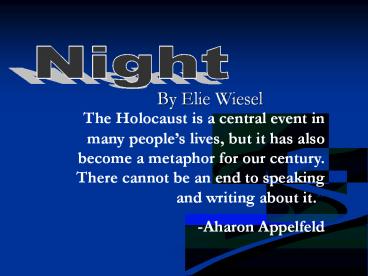By Elie Wiesel - PowerPoint PPT Presentation
Title:
By Elie Wiesel
Description:
By Elie Wiesel The Holocaust is a central event in many people s lives, but it has also become a metaphor for our century. There cannot be an end to speaking and ... – PowerPoint PPT presentation
Number of Views:208
Avg rating:3.0/5.0
Title: By Elie Wiesel
1
Night
- By Elie Wiesel
The Holocaust is a central event in many
peoples lives, but it has also become a metaphor
for our century. There cannot be an end to
speaking and writing about it. -Aharon Appelfeld
2
Facts and Literary Elements
- Author Elie Wiesel
- Type of work non-fiction/memoir
- Night is semi- autobiographical. Wiesel pulled
from his own experiences - POV first person reminiscent
3
Facts and Literary Elements Setting
- World War II/ Holocaust
- 1941-1945
- Various concentration camps in Poland and
Germany Auschwitz/ Birkenau, Buna, Gleiwitz, and
Buchenwald
4
The memoir begins in Sighet, Transylvania. During
the early years of World War II, Sighet remained
relatively unaffected by the war. The Jews in
Sighet believed that they would be safe from the
persecution that Jews in Germany and Poland
suffered.
5
(No Transcript)
6
About the Author
- born in 1928 in Sighet, Transylvania, now part of
Romania - In 1944 he was taken from his home at the age of
15 with his parents and three sisters and sent to
the Auschwitz concentration camp, then to Buna,
Birkenau, and finally Buchenwald
7
Family
- Father A major community and cultural leader
- Lived comfortably
- Mother and three sisters (Tzipora, Bea, Hilda).
8
Tradition
- Elie had a serious interest in Jewish studies
- He studied the Kaballah, Jewish Mysticism, and
the Talmud (Jewish law) from a very early age. - Spent hours studying.
9
In 1944, however, Elie and all the other Jews in
town were rounded up in cattle cars and deported
to concentration camps in Poland.He was 14.
10
They were sent to Auschwitz and then other
concentration camps.
Roll call in Buchenwald, February 1941
11
About the Author cond
- At Auschwitz he and his father were separated
from his mother and sisters(Tzipora, Bea, Hilda) - His father died 1945 while still held captive
12
About the Author Contd
- He survived the concentration camps and was
freed from Buchenwald in 1945 - He was sent to France and lived in an orphanage
until he came of age.
13
About the Author Contd
- He attended the Sorbonne where he studied
literature, philosophy, and psychology - For ten years he vowed never to speak of his
experience
14
About the Author Contd
- In 1956 he published his first version of Night.
He then shortened the novel and it was published
in English in 1960 - He has since written 40 other books
15
About the Author Contd
- He won the Nobel Peace Prize in 1986
- Now 86 years old
- Taught Boston University
- Often speaks out against Anti-Semitism. Recently
spoke out against Hamas.
16
Facts and Literary Elements Conflicts
- Major external conflict Eliezer struggles with
Nazi persecution, - Major internal conflict Eliezer struggles with
his own faith in God and in humanity
17
Facts and Literary Elements Themes
- Eliezers struggle to maintain faith in a
benevolent God - Silence
- Inhumanity toward other humans
- The importance of father- son bonds
18
WWII and the HolocaustContd
- The Holocaust A systematic extermination of
Europes Jews. - Six million European Jews murdered, making this
the greatest act of genocide known to the world - Gypsies, the handicapped, and Poles were also
targeted for destruction. Other victims included
homosexuals, Jehovahs Witnesses, Soviet
prisoners of war, and political dissidents.
19
WWII and the Holocaust
- Hitler comes to power in Germany in 1933. Hitler
creates the Nazi party (The National Socialist
Party)
20
WWII and the HolocaustContd
- He promoted the argument that Nordic peoples,
which he called the Aryan race, were superior to
any other group or race of people. - Under Hitlers instruction, Germany implemented a
set of Laws designed to dehumanize German Jews,
who were then subjected to violence and prejudice.
21
WWII and the HolocaustContd
- WWII begins on SEPTEMBER 1st, 1939-Germany
invades Poland. The Polish Armies crumble before
the new kind of warfare, the Blitzkreig.
22
WWII and the HolocaustContd
- JANUARY 19th, 1945
- Germany in full retreat on Eastern Front.
- MAY 1st, 1945Berlin surrenders to occupying
Soviet forces. - MAY 7th, 1945Germany formally surrenders.
23
Contd
- Most of the groups targeted by the Nazis were
killed in concentration camps, where they were
gathered, imprisoned, and forced into labor.
When they were no longer of use, they were
killed.
24
- By the end of WWII more than
- 35 million people
- were killed
- more than half
- were civilians.
25
Genocide
Geno-
cide
Geno from the Greek word genos, which means
birth, race, of a similar kind
-Cide from the French word cida, which means to
cut, kill
26
- http//vimeo.com/11093871
- http//www.youtube.com/watch?vQJbX8KF5vgs































